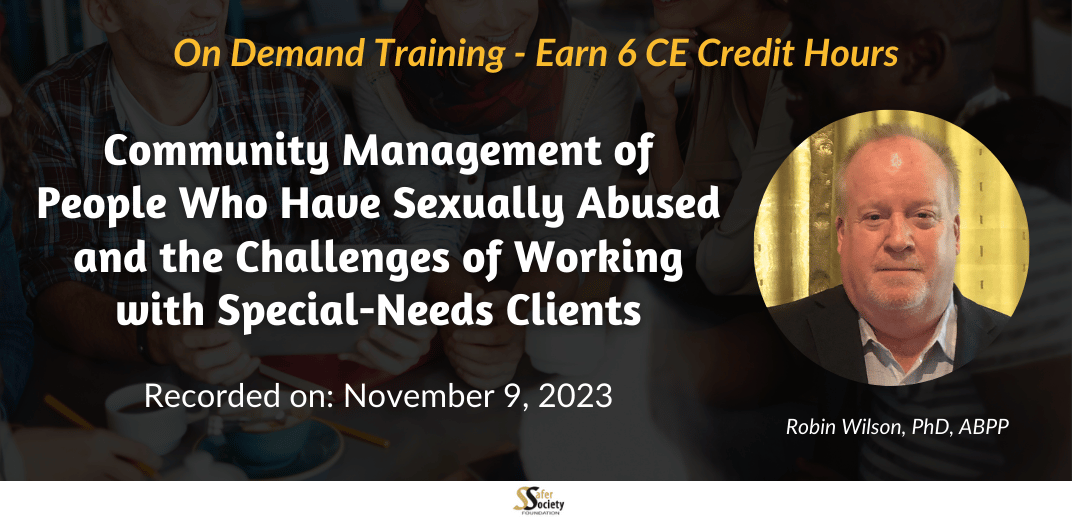
Community Management of People Who Have Sexually Abused and the Challenges of Working with Special-Needs Clients
Already purchased an On Demand training?
Click here to access your Safer Society On-Demand Training Center account.
This training provides practical information on two components that often go unexamined: sensible approaches to community management and how to work with clients with special needs.
The first half of this training summarizes and provides information on effective approaches to the community management of sexual violence risk, with a focus on the most current approaches. Policymakers have historically attempted to manage risk by instituting measures of official control, such as sex offender registries, GPS monitoring, and residency restrictions. However, the scientific literature suggests that such measures often don’t accomplish their intended goal. This training will explore the strengths and weaknesses of the available approaches and describe the core components of effective management.
The second half of this training explores the challenges in working with clients who have special needs. It explores how the principles of risk, need, and responsivity apply to this clientele. It offers an overview of methods for assessing risk and need, and strategies for adapting treatment to special-needs clients, including the use of applied behavioral analysis. It concludes with discussion of balancing the needs and rights of clients and the community.
Topics include:
- The core components of effective community supervision
- How historical approaches have gone wrong
- Current models of community supervision
- Applying the principles of risk, need, and responsivity with special-needs clients
- Identifying what’s missing in helping clients respond to treatment
- Balancing risks and rights with clients and the community
This training is part five of a five-part course.
To learn more about the full course on assessing and treating adults who sexually abuse, please click here.
1) Critique historical approaches to manage risk in the community.
2) Describe current models for community management of persons who have sexually offended.
3) Explain core components of effective community supervision.
4) Critique measures of assessing risk and need in clients with special needs.
5) Describe an applied behavioral analytic approach to clients with special needs.
6) Explain how traditional approaches often don’t adhere to the responsivity principle of effective correctional treatment.
Audience
This training is for professionals working with people who have problematic behaviors. Professionals who will benefit from this training include social workers, psychologists, clinical counselors, and interested paraprofessionals.
Content Level
Disclosure
Continuing Education Approval
American Psychological Association (APA)
Safer Society Foundation, Inc. is approved by the American Psychological Association (APA) to sponsor continuing education for psychologists. Safer Society Foundation, Inc. maintains responsibility for this program and its content.
Who's Presenting

Robin Wilson, Ph.D., ABPP
Robin J. Wilson, Ph.D., ABPP is a Canadian researcher, educator, and board-certified clinical psychologist who has worked in clinical and forensic psychology in hospital, correctional, and private practice settings for more than 35 years. Robin has published and presented internationally on the assessment, treatment, and risk management of social and sexual psychopathology. Robin maintains an international practice in clinical and consulting psychology based in Sarasota, Florida, and has been an Assistant Clinical Professor (Adjunct) of Psychiatry and Behavioural Neurosciences for more than 10 years at McMaster University in Hamilton, Ontario. Robin’s current interests are focused on collaborative models of risk management and restoration as persons of risk are transitioned from institutional to community settings, in addition to ensuring responsive clinical and supervisory service delivery for individuals with special needs.
